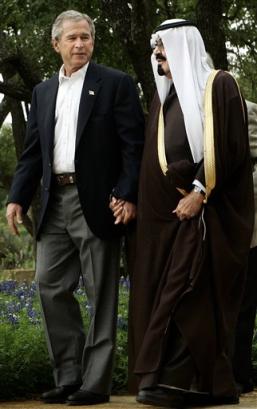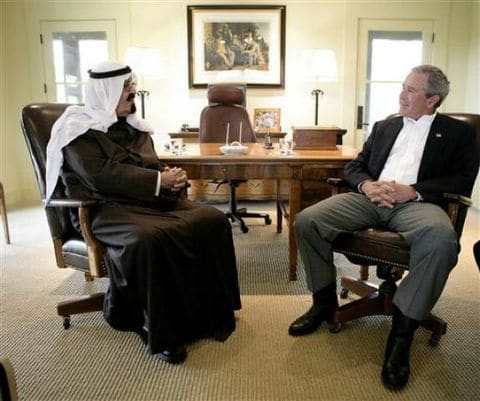
Last Monday, in the midst of yet another national uproar over gasoline prices, the Crown Prince of the House of Bush gave a very affectionate welcome to (America’s oil-rich friend) the Crown Prince of the House of Saud at the Western White House in Crawford, Texas.
(Incidentally, it is instructive to note that Prince Abdullah is the only world leader accorded the honor of being invited to meet President Bush at his ranch on two separate occasions. And, despite pretensions to the contrary, such invitations are highly coveted in capitals around the world. Therefore, can you imagine the envy French President Jacque Chirac must feel for having never been invited? But I digress….)
Bush’s affectionate embrace of the Saudi Prince sent political tongues wagging (and late-night comedians into creative overdrive). After all, such an extraordinary public display seemed not only diplomatically inappropriate but also politically insulting to the American people in light of the declared tensions between America and Saudi Arabia over lingering 9/11 issues and the current oil crisis.
And, it will take more than the conveniently timed (recycling of) energy initiatives Bush announced today to quell concerns about his failure to demonstrate what benefits redound to America’s favor from his treating the Saudis like the fourth rail of American politics (or worse yet, intimate friends).
For starters, it’s worth recalling that on the eve of entertaining Prince Abdullah at his ranch in April 2002, Bush promised Americans that he would “talk down” the price of crude oil with his royal compadre – “mano a mano”. But in the years that followed, oil prices have actually doubled (no doubt much to the constrained glee of Bush’s Saudi and Texas oil friends).
Therefore, it seems more than a little ironic, if not incredulous, that Bush reiterated the same promise (to get the prince to put out) on the eve of their date just days ago. Indeed, that unfulfilled promise of 2002 begs the question:
What is America (and Bush personally) getting out of this relationship with Saudi Arabia?
After all, relying on the Saudis to fulfill Bush’s promise to bring down the price of oil has proved a fools comfort to the American people. And, last fall, Bush himself had to endure sinister charges from John Kerry about secret deals with Prince Abdullah to lower oil prices (to the $25 target) to pump up his reelection prospects. (Charges that proved embarrassingly misinformed when prices stuck at over $50 right through Election Day.)
Yet, despite his obvious fecklessness, Bush continues his public prodding of the Saudis to increase oil production – as he did with the following statement made just days ago:
I don’t think they’re pumping flat out. I think they’re near capacity, and so we’ve just got to get a straight answer from the government as to what they think their excess capacity is.
For their part, the Saudis make it clear that they do not take Bush’s prodding seriously. Indeed, they dismiss it outright as a gesture designed only to manage his short-term political liabilities from high gasoline prices. Because, they proffer, high gasoline prices in America have nothing to do with their failure to increase oil production. Instead, they blame misguided environmental concerns that, for decades, have caused successive American governments to neglect the country’s oil refining capabilities.
As it happens, the Saudis have a point. Indeed, Bush even echoed their assessment today in his energy speech by calling for new refineries and other measures (including going nuclear) to decrease America’s dependence on foreign oil. And, he seemed genuinely hopeful that these measures would help ease the hardships on Americans caused by high oil prices.
The only problem is that the Saudis also have a point when they imply that Bush’s energy policy is nothing but a political ruse. And, for anyone who takes umbrage at this portrayal of the “I mean what I say and say what I mean” President as a craven political opportunist, the followings words from Bush’s 17 May 2001 “national energy policy speech” might provide a rude awakening:
The major reason for dramatic increases in gasoline prices today is the lack of refining capacity, and my plan gives the needed flexibility and certainty so refiners will make the investments necessary to expand supply by increasing capacity.
Clearly, all Bush did today was repeat the hollow energy initiatives he proposed three years ago; and, with the same incredulous gusto that he repeated his hollow promise to talk down the price of oil with his Saudi friends.
Nevertheless, Bush is not entirely to blame for America’s failure to develop alternative sources of energy. But the failure of successive presidents to resolve this problem does not absolve him from having to explain the glaring contradictions in his (and America’s) relationship with the Saudis. After all, the Saudis are:
- doing nothing to lower gas prices;
- remaining defiantly undemocratic despite Bush’s democracy crusade;
- demanding the US downsize its military bases in Saudi Arabia to appease Islamic Jihadists;
- continuing to fund Wahhabi Madrassas, which teach hatred and destruction of America as a core subject; and
- showing no concern over their Saudi connection to 9/11, namely that Bin Laden and the majority of the hijackers were from Saudi Arabia.
Therefore, one has to wonder what benefits they provide to remain exempt from American reprimand, sanction, or usurpation. Indeed, the mysterious nature of this relationship only deepens when one considers that the Saudis depend on American security guarantees for their survival. After all, this precludes using oil as leverage to resist the democratic changes Bush has demanded of and imposed upon other nations.
(Of course, if Bush were truly a man of his word, such a move by the Saudis would only make his day because it would finally give him just cause to invade an Arab country….)
Ultimately, the public policy contradictions that characterize the US and Saudi Arabia relationship compel one to conclude that the Saudis are not so much allies of the United States as they are private patrons of the Bush family Dynasty.

Indeed, only a thriving personal interest can explain why the cowboy strutting George W. Bush morphs into a hand-holding, flower-loving, huggin, kissin chicken when that royal Saudi rooster comes a-callin. And, it seems fair to wonder whether Bush family members own shares (through elusive trusts and other cleverly disguised arrangements) in oil companies that are benefiting from inflated oil prices. Moreover, if anyone thought the Chinese funding of Clinton’s Presidential Library was scandalous, future disclosures of the Saudi funding of Bush’s Presidential Library (and his post-presidential sinecure) might prove positively treasonous.
At long last, as nefarious as it seems, only Bush’s personal financial motives can account for the egregiously unrequited nature of America’s public relationship with Saudi Arabia – post 9/11.
News and Politics
Leave a Reply
You must be logged in to post a comment.